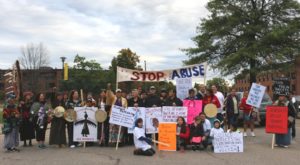Sault Ste. Marie International Bridge used to raise awareness on human trafficking

By Laura Barrios
SAULT STE. MARIE—Human sex trafficking: a very difficult issue to discuss, yet one that needs to be more openly communicated. The Persons Against Crimes of Trafficking (PACT) Nookimis (Grandmothers) launched their inaugural International Bridge Walk on Raising Awareness of Human Trafficking on Oct. 1, to bring greater awareness to this escalating issue.
The event began at the Lake State University campus in Sault Ste Marie, Michigan, where some 30 participants of all walks of the earth, commenced the walk towards the Sault Ste. Marie International Bridge holding up various signs and banners, each carrying a different message, while also singing in unison to the beat of traditional drums.
“…When we walk and create awareness like this, it actually sends something out into the world. So people seeing the signs as they’re driving by, it’s going to go over social media, but it’s more than that,” stated Isaac Murdoch, Facilitator at Ojibway Connections in Serpent River First Nation. “Because when they walk with those Eagle Staffs across that water, it actually sends medicine out, it sends something out there to help. The more that we gather, the more that we come in ceremony, the more that we dance, the more that we sing, the more difference we make.”
The walkers occupied one side of the bridge while the traffic was directed into the opposite lane. Though traffic grew larger from both sides, travelers did not seem to mind as indicated by their honking, waving, and thumbs up as they read the messages and acknowledged the cause.
“Right now, there’s a lot of confusion as to what’s going on. A lot of this stuff is underground. A lot of this stuff we can’t see it, but we know it exists,” stated Murdoch. “Events like this are really important and help expose a lot of the issues…human trafficking being one of them.”
The International Bridge was chosen as the venue for the walk because of its symbolism it holds to the cause itself.
“It’s an international problem, [trafficking] doesn’t just target Aboriginal people, it targets everyone,” noted Marly Day, one of the 10 PACT Grandmothers. “We were doing this for everyone [affected].”
Dr. Sheila Smith, one of the founding members of PACT Ottawa believes further studies need to be conducted across the nation to truly expose just how many victims there are in human trafficking.
“There’s trafficking happening in Canada and PACT Ottawa did the first ever study,” stated Smith. “[In] the small study that we did, we found out that there are 140—women—that are trafficked in Ottawa. 90 percent of those women are Canadian. In that study, 15 percent were First Nation.”
Isabelle Meawasige, Bear Clan member of Serpent River First Nation and one of the PACT Grandmothers added that human trafficking amongst First Nation women and girls is more prevalent in the north.
“Aboriginal girls make up 70 percent of human trafficked persons in this area. That’s way too high!” noted Meawasige. “We’ve got to do something about that. So we decided that we will do whatever…and on a shoe string budget.”
Zhiibaahaasing First Nation Chief Irene Kells travelled long and far to attend and participate in the inaugural walk.
“You’re never too old to do anything, and you’re never too young. The purpose of this walk today, is [to remind us to remind] the young women, young men, to be safe and to be careful on how they walk the road out there,” stated Kells. “It’s sad that there are so many young girls and boys that have been murdered, taken away, lost. Some of them have never been found. It’s sad. It’s still going on today. And this is why I walk, and pray, and think about them because there’s not enough of that going on. Not enough people doing it. We have to get the word out.”
As a preventative effort, Day believes that reaching out to young boys and girls to give them an identity and have a great sense of belonging will be instrumental to preventing further incidents.
“We need to get them back into the culture. We have to target them. Give them an identity. Give them values, beliefs,” stated Day. “I do traditional teachings to teach our young girls that this is their way of life. To give them their identity is crucial.”
Alison Recollet-Simon, a PACT Grandmother echoes the idea that children will need to be reached out to sooner, but also believes that women will need to work harder to spearhead this issue.
“As mothers, grandmothers, we try so hard to protect our children. Somewhere along the lines though, it happens,” noted Alison. “We have to have a greater voice…we need our women to have leadership.”
The success of this event was made possible through the efforts of many individual parties. The PACT Grandmothers thanked the many supporters who helped make the walk possible, along with the supports that allowed the message be delivered safely.
“The collaboration between PACT Grandmothers, [Canada Border Service Agency], and the [local and provincial] police was phenomenal,” stated Smith.
“To have support from Border Patrol was awesome,” added Murdoch. “It makes such a difference when we can all work together for a common cause. And we know that the cause that we’re standing for today is for our children and people who are stuck in trafficking.”
The walk concluded with a Jingle Dress song sung by Murdoch, and a Jingle Dress dancer, Barb Day, who jointly shared their gifts for the Missing and Murdered Indigenous Women, and those victims of sex trafficking; a luncheon for all participants where stories, speeches, and facts were shared, and gifts distributed on behalf of the Three Fires from Sault Michigan to all participants by Keinna Masta, a PACT Grandmother.


